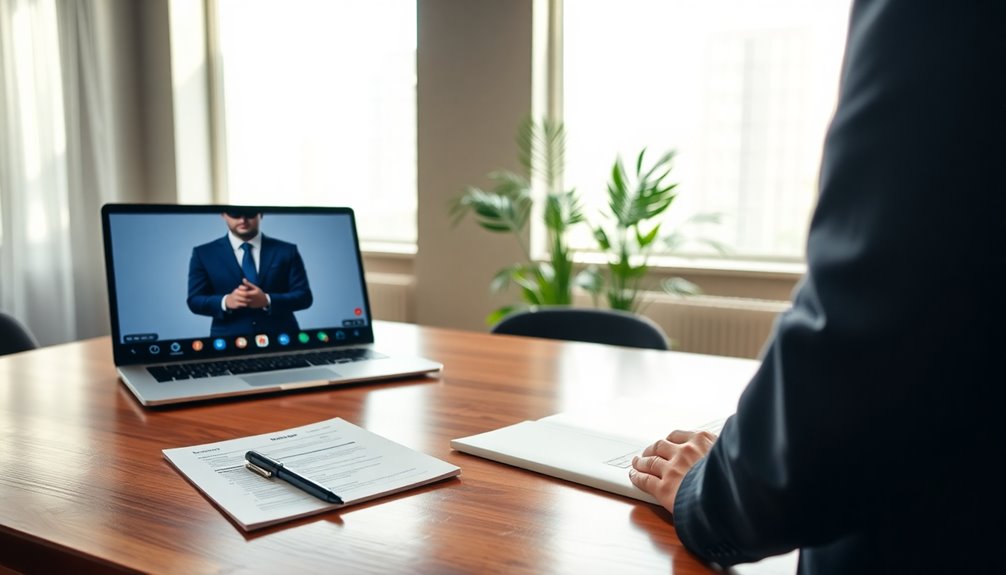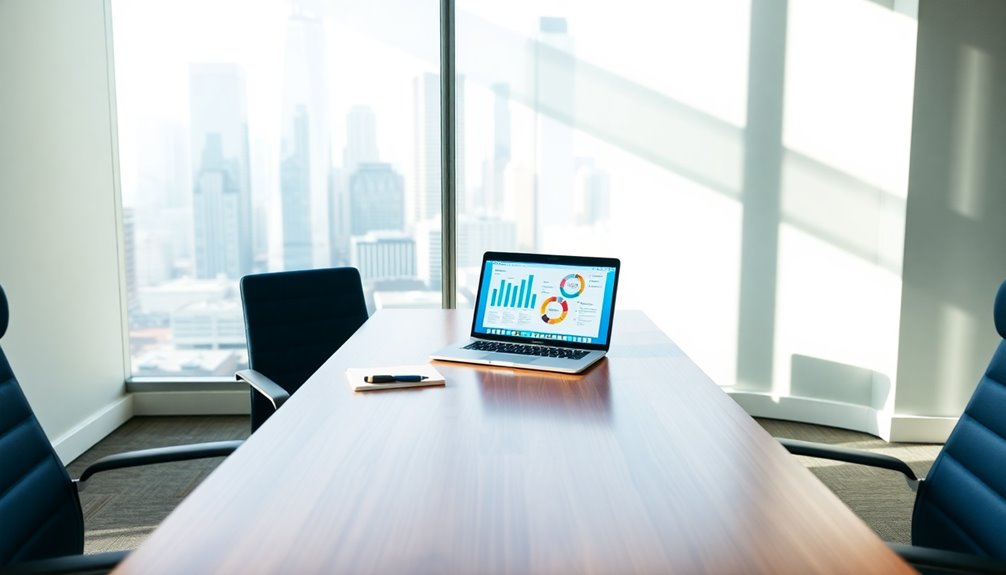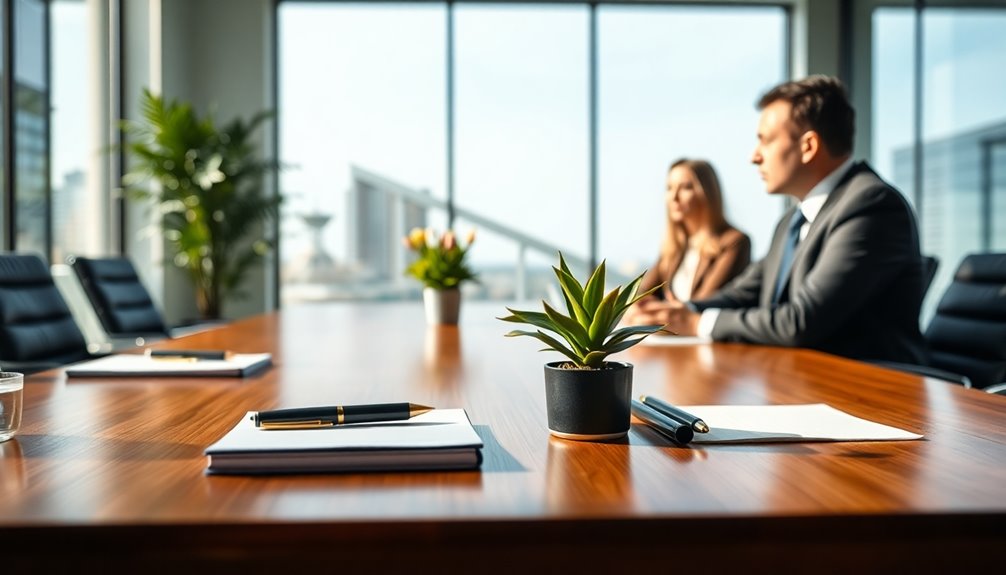To ace your job interview, start with solid preparation. Arrive 10-15 minutes early, bring extra resumes, and research the company's mission. Build rapport with positive body language and maintain eye contact. Listen actively by nodding and asking follow-up questions. Showcase your relevant skills and adaptability, connecting them directly to the employer's needs. Dress appropriately and express gratitude at the end. Don't forget to send a personalized thank-you note afterward. These essential strategies can set you apart in the competitive job market. Want to discover more tips to elevate your interview game? You'll find plenty of insights ahead!
Key Takeaways
- Arrive early to demonstrate punctuality and collect your thoughts before the interview begins.
- Research the company's mission, values, and recent news to tailor your responses.
- Practice positive body language and maintain eye contact to convey confidence and engagement.
- Prepare insightful questions to showcase genuine interest in the organization and role.
- Follow up with a personalized thank-you note within 24 hours to reinforce your appreciation.
Preparation Essentials
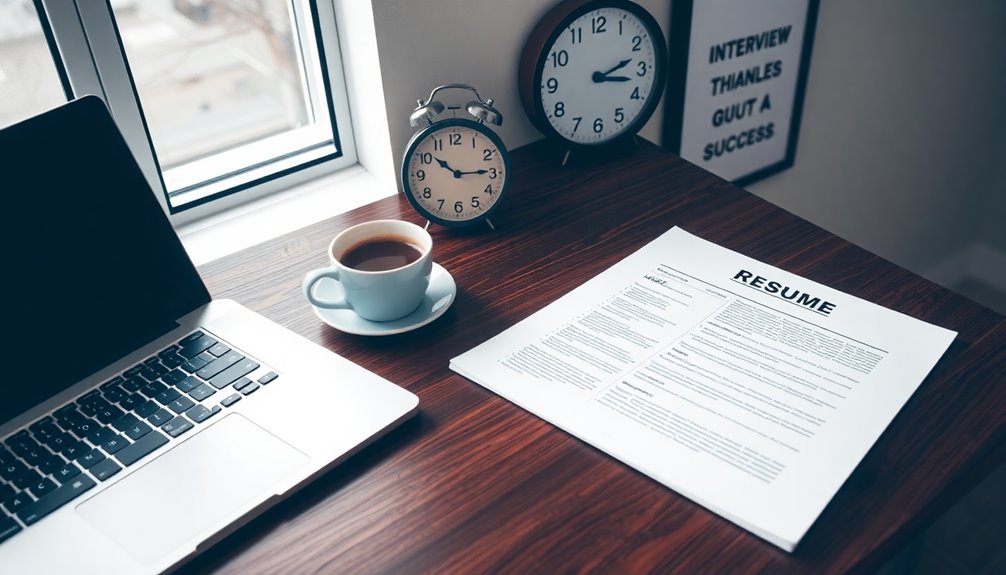
Before heading into your job interview, preparation is key. You'll want to guarantee you've covered the preparation essentials to make a great impression. Arriving 10-15 minutes early not only demonstrates your punctuality but also gives you a moment to collect your thoughts before the interview begins.
Take the time to research the interviewer's name and use it during your conversation; this personal touch can greatly enhance your connection. Make certain to bring several copies of your resume and a transcript, organized for easy access. This way, you're ready for any situation that may arise.
Don't forget to carry a reliable pen and notepad so you can jot down immediate post-interview notes. These notes will be invaluable for your follow-up correspondence. Finally, prepare a list of insightful questions to ask. This shows your genuine interest in the organization and highlights your research efforts.
Building Rapport

Building rapport during your interview is essential for making a genuine connection with your interviewer. Focus on using positive body language, practicing active listening, and sharing personal stories that resonate. These techniques not only create a comfortable atmosphere but also help you stand out as a candidate.
Positive Body Language
Positive body language plays an essential role in establishing rapport during your job interview. Your non-verbal cues can convey confidence and interest, creating a welcoming atmosphere for both you and the interviewer. Here are three key aspects of positive body language to keep in mind:
- Maintain Eye Contact: This shows that you're engaged and interested in the conversation. It helps build trust and connection with the interviewer.
- Offer a Firm Handshake: This initial gesture conveys confidence and professionalism. It sets a positive tone right from the start, making a strong first impression.
- Adopt an Open Posture: Keep your arms uncrossed and lean slightly forward. This signals that you're attentive and keen to participate in the discussion, making the interviewer feel valued.
Incorporating these elements of positive body language can greatly enhance your rapport, ensuring that your enthusiasm for the role shines through. Remember, your non-verbal communication can reinforce your verbal messages, so use it to your advantage during the interview.
Active Listening Techniques
Active listening is essential for establishing a strong connection during a job interview, as it showcases your engagement and respect for the interviewer's insights. By actively listening, you create an environment that encourages open dialogue and fosters rapport.
Here are some effective active listening techniques:
| Technique | Description |
|---|---|
| Nodding | Signals agreement and encourages the speaker. |
| Eye Contact | Shows attentiveness and builds trust. |
| Verbal Affirmations | Phrases like "I see" or "That makes sense" indicate you're processing the information. |
| Paraphrasing | Summarize the interviewer's points to clarify and demonstrate understanding. |
Incorporating follow-up questions based on their comments can deepen the conversation and showcase your genuine interest. This approach not only illustrates that you're actively engaged but also helps clarify any misunderstandings. Practicing active listening can even reduce your anxiety by shifting the focus from yourself to the interaction, making the interview more comfortable for both you and the interviewer. By mastering these techniques, you'll create a memorable impression and enhance your chances of landing the job.
Personal Connection Stories
One effective way to connect with your interviewer is by sharing a brief personal story related to the role. These personal connection stories can create a memorable bond and demonstrate your enthusiasm for the position. When you discuss a relevant experience or challenge, you humanize yourself, making you more relatable. Here are three tips to keep in mind:
- Find Common Ground: Identify shared interests or values that can help foster a positive rapport. This shared connection can make a difference in how comfortable both of you feel during the interview.
- Acknowledge Your Feelings: If you're feeling nervous, don't hesitate to mention it early on. This honesty can break the ice and help both you and the interviewer feel at ease.
- Practice Active Listening: Respond thoughtfully to the interviewer's comments. This shows you value their perspective and can lead to a more engaging conversation, ultimately building mutual respect.
- Share Your Growth: Discuss how past experiences have shaped your skills and resilience, as this reflects your ability to overcome challenges and highlights the importance of self-reflection in personal development.
Effective Communication

Effective communication is key during your job interview. By actively listening and expressing your thoughts clearly, you not only show professionalism but also create a more engaging conversation. Let's explore how you can enhance your communication skills to make a lasting impression.
Active Listening Techniques
How can you make a lasting impression during a job interview? One powerful way is through active listening. This means fully concentrating on what the interviewer says, which can greatly enhance the quality of your conversation. By mastering a few techniques, you'll not only show that you're engaged but also value their input.
Here are three effective active listening techniques to employ during your interview:
- Nod and Affirm: Use body language like nodding and verbal affirmations such as "I see" or "That's interesting" to convey attentiveness.
- Summarize Key Points: After the interviewer shares information, briefly summarize what they said to demonstrate understanding and retention.
- Ask Clarifying Questions: If something isn't clear, don't hesitate to ask questions. This shows that you're thinking critically about the conversation.
Additionally, maintaining eye contact and appropriate body language while they speak reinforces your interest and confidence. Practicing these active listening techniques will help you provide thoughtful, relevant responses, making you a more compelling candidate. Remember, effective communication is a two-way street! Engaging in open communication allows for better understanding and connection, which is crucial during interviews.
Clear Expression Strategies
Clear expression during a job interview can set you apart from other candidates. By employing effective clear expression strategies, you can communicate your thoughts clearly and confidently. Always aim to answer questions directly and support your points with relevant examples showcasing your skills.
Maintaining proper grammar and vocabulary reflects your professionalism, so pay attention to these details. When faced with complex questions, don't hesitate to ask for clarification; this shows your active listening and engagement. Use strategic phrases like "That's a great question" to buy time while you think through your answers.
Here's a table to help you remember key clear expression strategies:
| Strategy | Description |
|---|---|
| Direct Responses | Answer questions directly and concisely. |
| Relevant Examples | Use examples to illustrate your skills and experience. |
| Active Listening | Pay attention and ask for clarification if needed. |
| Strategic Phrases | Use phrases to give yourself time to think. |
| Composed Personal Insights | Prepare responses for personal questions thoughtfully. |
Understanding Interview Dynamics

Steering through the dynamics of a job interview can feel overwhelming, especially when you realize that many candidates endure multiple rounds before landing an offer. To navigate this process effectively, focus on making a good first impression and maintaining professionalism throughout. Here are three key strategies to keep in mind:
- Respect Everyone: Treat all staff members, from the receptionist to the interviewer, with respect. Their opinions can impact hiring decisions, so make sure you're courteous to everyone.
- Close Strong: End your interview on a positive note. Asking about next steps and expressing enthusiasm for the role can leave a lasting impression on the interviewer.
- Follow Up: Sending a thank-you note after your interview not only shows appreciation but also reaffirms your interest in the position. This simple gesture can greatly sway hiring decisions in your favor.
Professional Etiquette

Maneuvering the interview process is only part of the equation; understanding professional etiquette can make a significant difference in how you're perceived. First and foremost, treat everyone you encounter with respect, from the receptionist to the interviewer. Remember, their opinions can influence the hiring decision.
Next, maintain a professional demeanor by dressing appropriately for the industry. Your attire should reflect the standards of the organization you're applying to. While speaking with interviewers, avoid negative comments about former employers or colleagues—this behavior can tarnish your professional image.
At the interview's conclusion, always express gratitude. Thank the interviewer for their time and insights; this simple gesture reinforces your appreciation for the opportunity. Following up with a thank-you note or email is essential. It shows courtesy and reiterates your interest in the position and the organization. Additionally, showcasing strong communication skills during the interview process can significantly enhance your rapport with the interviewer.
Incorporating these elements of professional etiquette not only demonstrates your professionalism but also leaves a lasting impression. By being respectful, well-dressed, and gracious, you elevate your chances of making a positive impact during the interview process.
Researching the Company
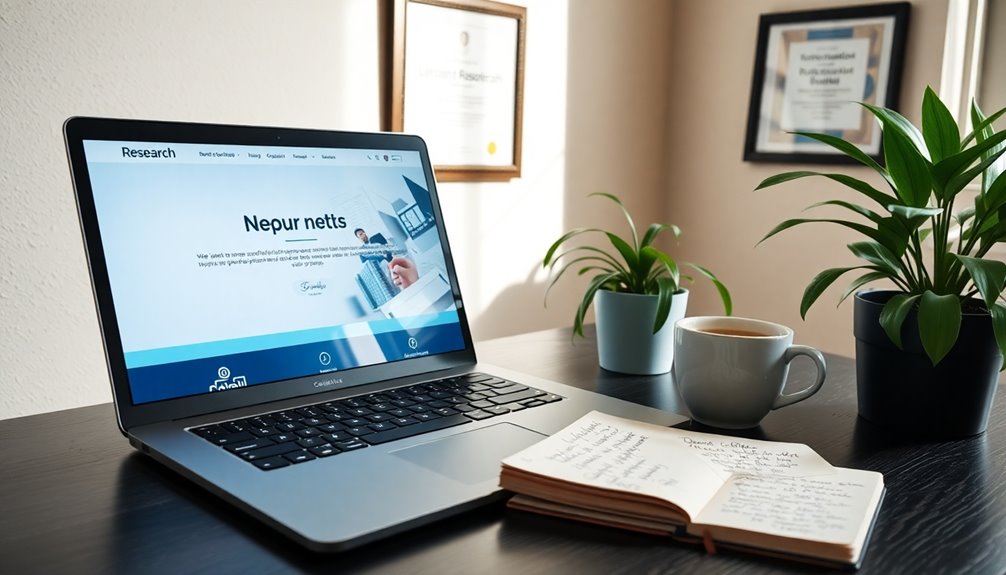
Thorough research is essential when preparing for a job interview, as it not only enhances your confidence but also demonstrates your genuine interest in the company. By investing time in researching the company, you can present yourself as a well-informed candidate who aligns with their values and goals. Here are three critical areas to focus on:
- Mission and Values: Investigate the company's mission and values to see how they align with your own. This understanding helps you present yourself as a cultural fit.
- Recent News: Review recent news articles and press releases about the company. This knowledge keeps you informed about their latest projects, achievements, or challenges, allowing you to engage meaningfully during the interview.
- Industry and Competitors: Familiarize yourself with industry standards and main competitors. This insight enables you to articulate how the company differentiates itself, showcasing your industry awareness.
Making a Strong First Impression

After you've done your homework on the company, making a strong first impression becomes your next focus. Arriving 10-15 minutes early to your job interview not only demonstrates punctuality but also helps you stay calm and feel comfortable before the meeting. As you greet the interviewer, make sure to offer a firm handshake, genuine smile, and maintain eye contact. These little gestures can notably influence their perception of you.
Good posture is vital; it projects confidence and conveys professionalism, making you appear more engaged. Positive body language, such as nodding and maintaining eye contact, can create a welcoming atmosphere. This rapport is essential, especially if you feel you have a lack of experience in some areas.
Ever since you've prepared to answer questions to ask, remember to incorporate insightful questions that relate to the company. This not only showcases your transferable skills but also reinforces your genuine interest in the role, helping you make a good fit. By following these tips for a successful interview, you'll be able to overcome any nerves and leave a lasting impression that makes them want to come back for more.
Showcasing Personal Insights
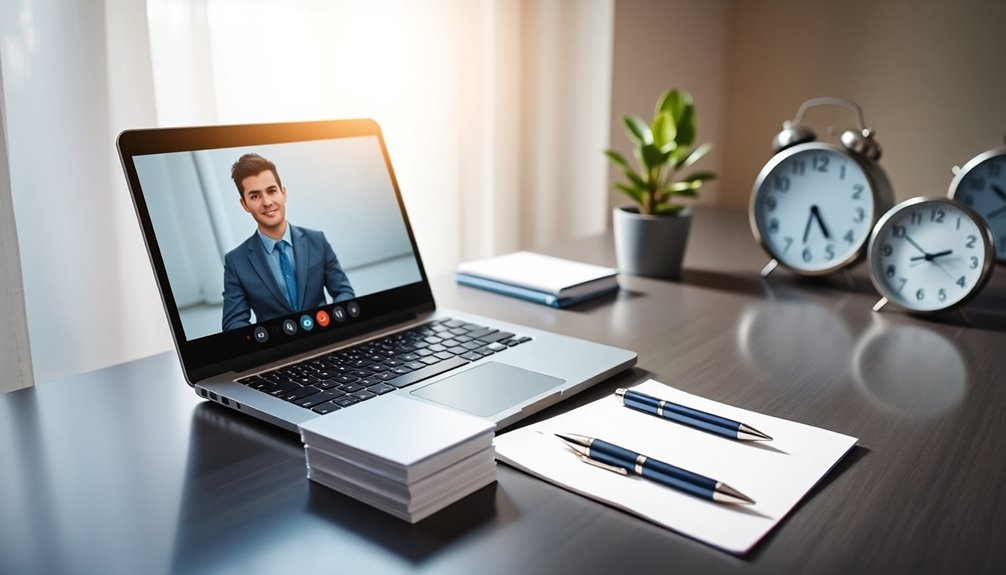
To stand out in your interview, share personal facts that reveal your personality and interests. Highlighting transferable skills can show how your unique experiences make you a great fit for the role. By connecting your insights to the company's values, you can create a lasting impression that goes beyond just your resume. Additionally, demonstrating your commitment to mental clarity and health through techniques like meditation can showcase your proactive approach to personal well-being.
Personal Facts Sharing
Three well-chosen personal facts can considerably enhance your job interview experience by fostering a genuine connection with your interviewer. Sharing personal insights not only humanizes you but also demonstrates your fit for the company culture. Here are three types of facts you might consider:
- Hobbies and Interests: Share a hobby that reflects your creativity or teamwork, like painting or playing in a local sports league. This can show your personality beyond the resume.
- Personal Experiences: Talk about a challenge you faced, such as organizing a community event. Highlight how you adapted and solved problems, showcasing your capabilities in a relatable way.
- Values Alignment: If the company prioritizes sustainability, mention your efforts in eco-friendly practices at home. This can illustrate that you share their values, making you a more relatable candidate.
Practice delivering these personal facts smoothly. By doing so, you'll guarantee they enhance the conversation and reinforce your professional narrative. Tailoring your insights to resonate with the position you're applying for will make you memorable and relatable, enhancing your chances of success. Additionally, reflecting on past experiences can foster resilience and learning, which are essential for personal growth during interviews.
Highlight Transferable Skills
When you highlight transferable skills in your job interview, you create a powerful narrative that showcases your adaptability and value. Focus on key skills like communication, teamwork, and problem-solving, as these are essential across various roles and industries. Tailor your examples to align with the job description, making it clear how your skills directly relate to the position.
Share specific instances from your past experiences where you successfully utilized these skills. For example, describe a time when your communication skills resolved a misunderstanding in a team project or how your problem-solving abilities led to a significant improvement in a process. These stories help interviewers visualize how you handle challenges.
Additionally, emphasize your enthusiasm for the role and your willingness to learn. This shows that not only do you possess valuable skills, but you're also keen to grow and evolve within the organization. By connecting your transferable skills to the needs of the employer, you reinforce your potential impact and make a lasting impression. Remember, your adaptability is one of your greatest assets, so use it to your advantage during the interview!
Engaging With the Interviewer

Engaging with the interviewer can set you apart in a competitive job market. Your ability to connect and communicate effectively can leave a lasting impression. Here are three key strategies to enhance your engagement:
- Prepare Insightful Questions: Research the company thoroughly and come up with thoughtful questions about recent projects or industry challenges. This not only showcases your interest but also prompts a more meaningful dialogue.
- Active Listening: Show genuine interest by listening attentively to the interviewer's responses. Asking follow-up questions demonstrates your curiosity and keeps the conversation flowing naturally.
- Share Personal Stories: Highlight your qualifications and adaptability through relatable personal anecdotes. This makes the conversation more memorable and helps the interviewer see you as a well-rounded candidate.
Additionally, inquire about the company culture and values to assess if they align with your own. Maintaining an enthusiastic demeanor throughout the interview can further enhance the impression you leave. Your energy and interest can greatly influence how the interviewer perceives your candidacy, so let your passion shine through!
Follow-Up Strategies
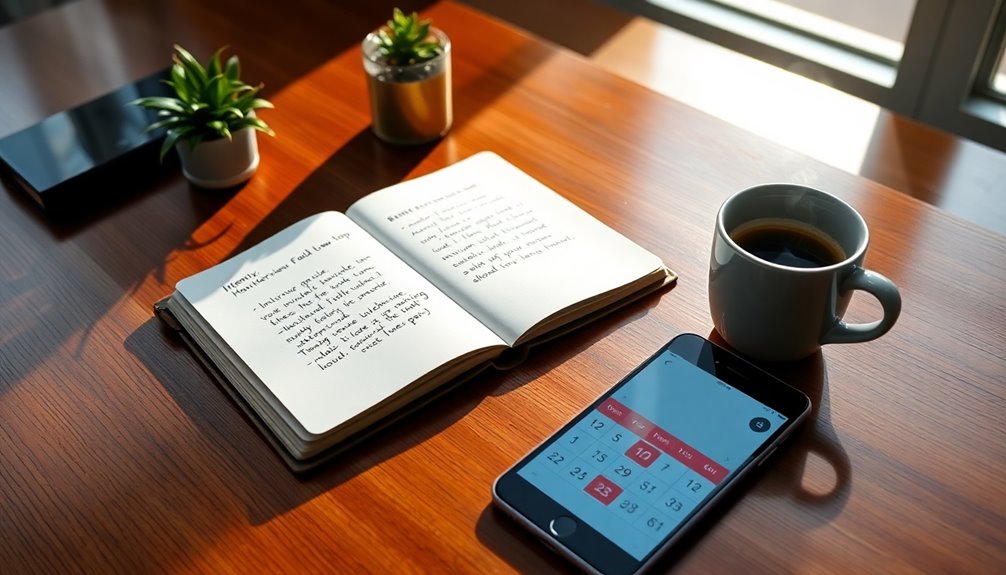
A well-crafted follow-up can be your secret weapon in leaving a lasting impression after an interview. Sending a thank-you note within 24 hours shows your appreciation and can greatly enhance your chances of being remembered positively. Personalize your message by referencing specific topics discussed during the interview. This indicates genuine interest and attentiveness, making you more memorable.
Following up also reaffirms your enthusiasm for the position. Candidates who send follow-ups are perceived as proactive and engaged, traits that employers value. If you haven't heard back within the timeframe indicated during the interview, a polite follow-up email can show persistence and continued interest in the role. Keep it brief and respectful; reiterate your enthusiasm without being pushy.
Additionally, consider engaging with your interviewers on professional social media platforms like LinkedIn. This helps maintain connections and keeps you top-of-mind for future opportunities. Remember, the goal of your follow-up is to reinforce your interest and leave a positive impression, so make it count! By employing these strategies, you'll set yourself apart from the competition and increase your chances of landing the job.
Frequently Asked Questions
What Are 5 Tips for a Successful Job Interview?
For a successful job interview, arrive 10-15 minutes early to show punctuality. Research the company's mission and the interviewer's background, so you can tailor your responses. Prepare specific examples that highlight your skills and achievements. During the interview, maintain positive body language, like making eye contact and offering a firm handshake, to convey confidence. Finally, follow up with a thank-you note to express appreciation and reinforce your interest in the position.
What Are the Five C's to Remember in an Interview?
You won't believe how essential the five C's are for nailing your interview! First, clarity helps you express your thoughts without confusion. Next, confidence shines through your body language and eye contact. Then, content is key; share compelling examples that highlight your skills. Don't forget connection—engage with your interviewer and ask thoughtful questions! Finally, courtesy shows your professionalism. Master these five C's, and you'll leave a lasting impression!
What Is the Golden Rule in an Interview?
The golden rule in an interview is simple: treat everyone with respect and kindness. Remember, every staff member you encounter, from the receptionist to the interviewer, can influence the hiring decision. Stay professional; avoid negative comments about previous employers, as they can reflect poorly on you. Listen actively to show engagement, and don't forget to send a thank-you note afterward. Honesty is essential, so never exaggerate or lie about your qualifications.
What Are the Three P's of a Successful Interview?
Steering an interview is like sailing a ship; you need the right tools to reach your destination. The three P's of a successful interview are Preparation, Practice, and Professionalism. You should research the company and job description to prepare effectively. Practice common questions to build confidence. Finally, maintain professionalism by dressing appropriately and being punctual. These elements help you manage stress and communicate your best self, making a lasting impression on potential employers.
Conclusion
In the fast-paced world of job interviews, you can either stand out like a beacon or blend in with the crowd. By preparing thoroughly and building genuine rapport, you'll transform nervous energy into confident conversation. As you showcase your unique insights, remember that effective communication can bridge the gap between you and the interviewer. Finally, a thoughtful follow-up can be the difference between being forgotten and being remembered. Don't just aim for success—make it your reality!
